After meeting on 27th and 28th June, the international Jury of the 2024 European Prize for Urban Public Space has chosen the 10 finalists for this year’s award, 5 in the General category and 5 in the Seafronts category.
5 FINALISTS GENERAL CATEGORY
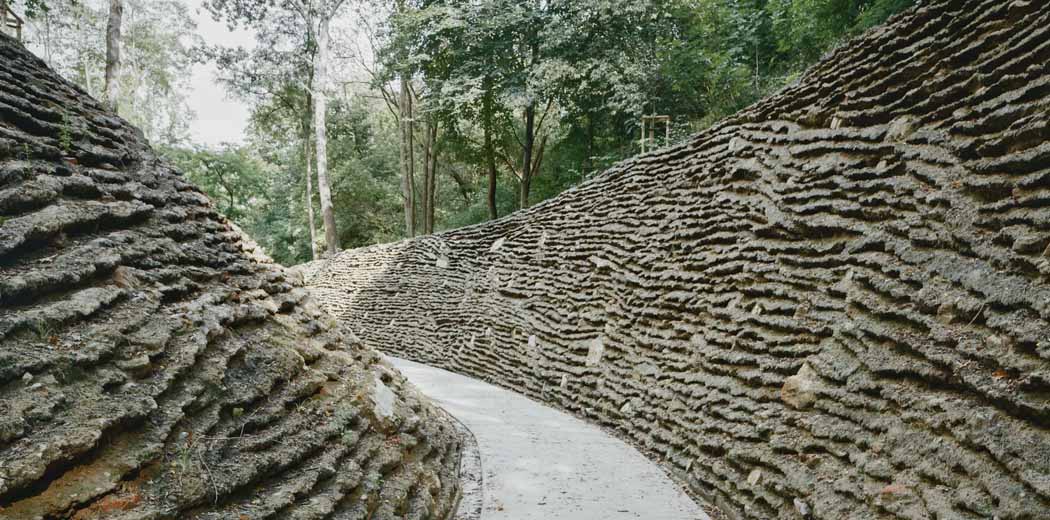
Park at the Warsaw Uprising Mound
Warsaw (Poland), 2023
A new park offers a public space connected to the memory of the place. It does so in an innovative way, creating a new urban area with character that acknowledges and visibilizes history, recycling the ruins of World War II destruction, and with the future in mind, providing a park that is accessible and enjoyable for citizens. It achieves this by means of strategies that are sensitive to the ecological needs of the area, projecting a unique integration of memory, leisure and ecology.
Developer: Zarząd Zieleni m.st. Warszawy
Authors: topoScape, Archigrest
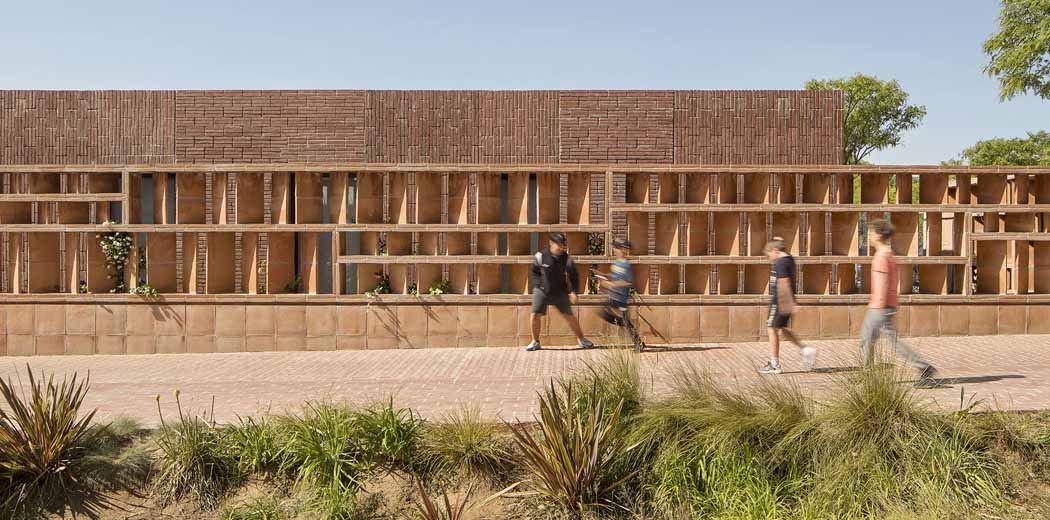
Boca de la Mina Promenade
Reus (Spain), 2022
A new promenade exemplifies the seamless integration of landscape, history, ecological needs, and health and leisure activities by means of meticulous design. The use of handmade brick gives the site a coherent character, while the clear water management strategy enhances landscape-urban permeability. This approach supports open-air activities for the citizens of Reus and its surroundings, promoting both ecological and recreational benefits.
Developer: Ajuntament de Reus
Authors: Batlleiroig (Enric Batlle Durany, Mario Súñer Díaz, Joan Roig i Duran, Iván Sánchez Fabra)
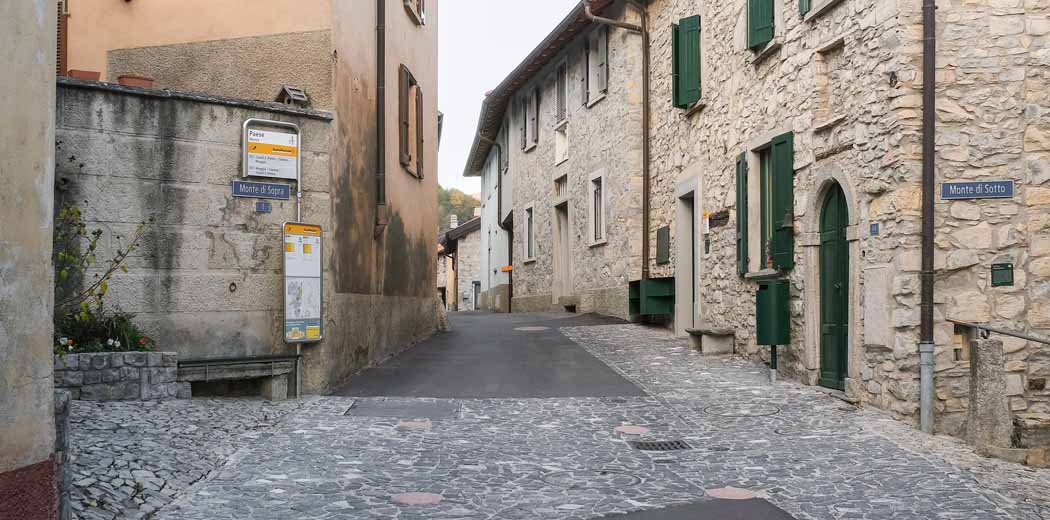
Seven interventions in Monte
Castel San Pietro (Switzerland), 2022
This project is the result of a thorough study of several peripheral regions of Ticino, where the needs and challenges faced by the elderly population in their everyday lives were identified as issues to be addressed. Following these recommendations, Monte implemented a proposal that, through careful, sophisticated architectural craftsmanship, transformed the town into a more accessible, inclusive and supportive environment.
Developer: Comune di Castel San Pietro
Authors: studioser Architects ETH OTIA SIA

CHAPEX
Charleroi (Belgium), 2024
This large structure exemplifies how post-industrial sites can be reintegrated into the urban landscape and public life. It achieves this by leveraging the power of the unused structure and the project’s open-ended nature. This optimistic intervention embraces the existing site, identifies new opportunities with architectural intelligence and uses very limited resources to maximize urban qualities. It becomes an infrastructure ready for life to take over.
Developer: Ville de Charleroi, Igretec
Authors: AjdvivgwA : AM architecten jan de vylder inge vinck – AgwA
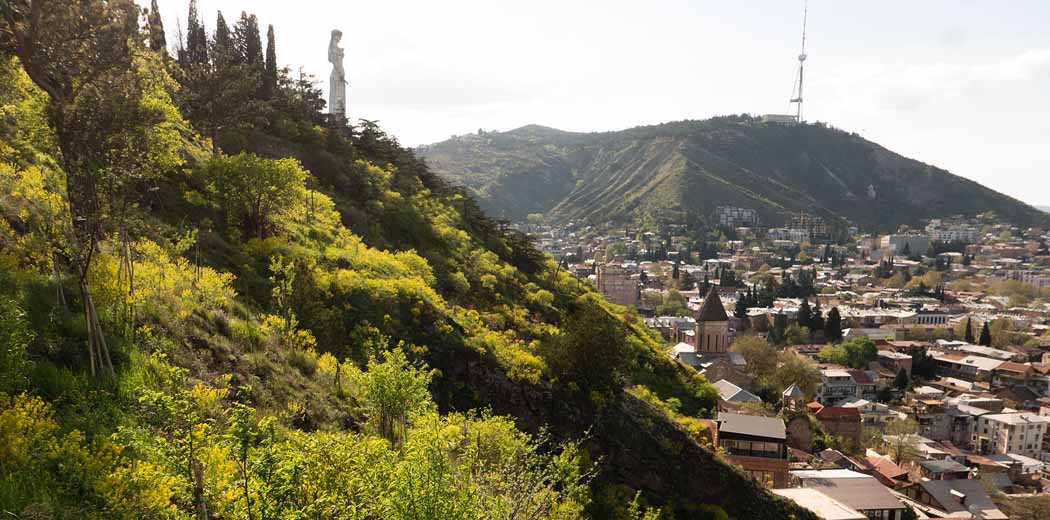
Urban Forest
Tbilisi (Georgia), 2023
This ambitious 700-hectare project aims to rectify a flawed plantation strategy from the 1920s that involved exclusively planting pines. This ageing pine plantation has suffered significant die-off due to pests and fungi, creating a fire hazard and posing a risk to public safety. The project serves not only as a remediation strategy, by increasing biodiversity through the introduction of autochthonous species, but also to develop new tools for addressing urban ecological interventions. It offers a new public space and an urban forest that helps contain unchecked urban growth, providing Tbilisi with a forward-looking, open-ended project.
Developer: Tbilisi City Hall, Cartu Foundation
Authors: Ruderal
5 FINALISTS SEAFRONTS CATEGORY
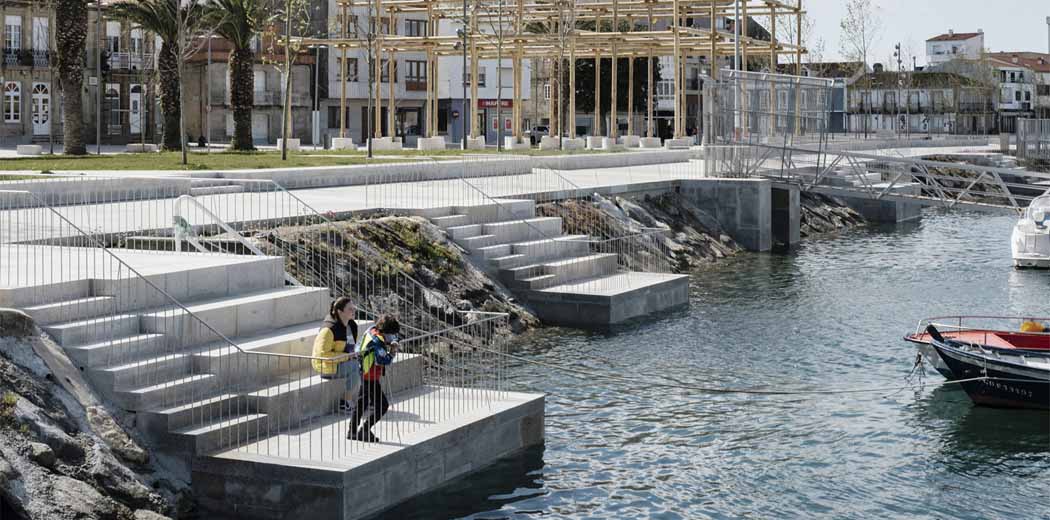
Beach improvement and redevelopment of the harbour edge
Porto do Son (Spain), 2022
This project renaturalizes the seafront, currently occupied by an urbanized strip, by creating a terrain with dunes that protects an existing park and rebuilds the relationship between port activity and the citizens. The intervention employs a gradient of strategies that respond to the varying conditions of the frontline, and recognizes the identity of this village—salting, drying nets, shipbuilding—, while demonstrating the benefits of collaboration over time between various political, civic and economic stakeholders.
Developer: Portos de Galicia - Consellería do Mar - Xunta de Galicia / Concello Porto do Son
Authors: RVR arquitectos, CREUSeCARRASCO
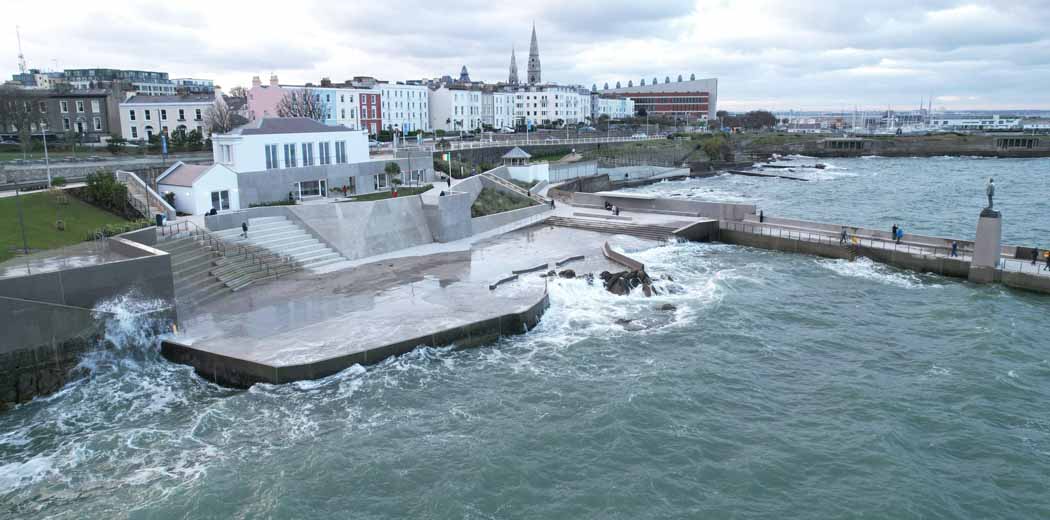
Redevelopment of Dún Laoghaire Baths
Dublin (Ireland), 2023
The project revitalizes the long-abandoned seafront facilities, reconnecting the town with the sea. This was achieved through the careful, skilful use of materials that acknowledge the ocean’s energy, resulting in a robust, socially inclusive new route to the water for all citizens. The project included the removal of old, dilapidated buildings, opening new public spaces that restore the citizens’ relationship with the sea.
Developer: Dún Laoghaire Rathdown County Council
Authors: DLR Architects Dept. + A2 Architects
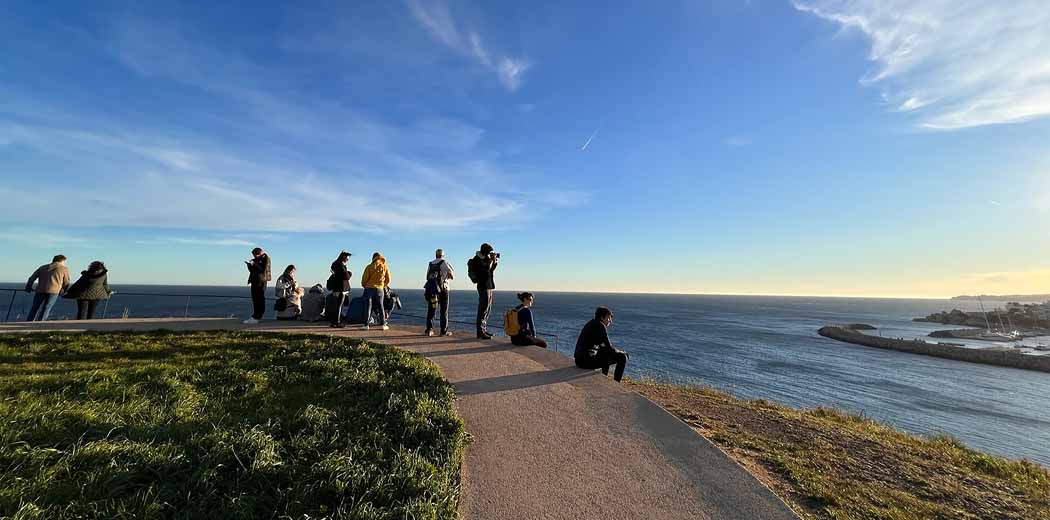
Coastal walk
Palamós (Spain), 2021
This 5 km coastal intervention exemplifies excellent design, preserving and enhancing the coastal landscape while connecting the town, nearby beaches and a natural park. Through minimal interventions that maximize impact, it demonstrates a deep understanding of the site. This approach celebrates the sublime landscape, reduces user impact and ensures its protection.
Developer: Ajuntament de Palamós
Authors: Ardevol Consultors Associats, Estudi Martí Franch Arquitectura del Paisatge SL
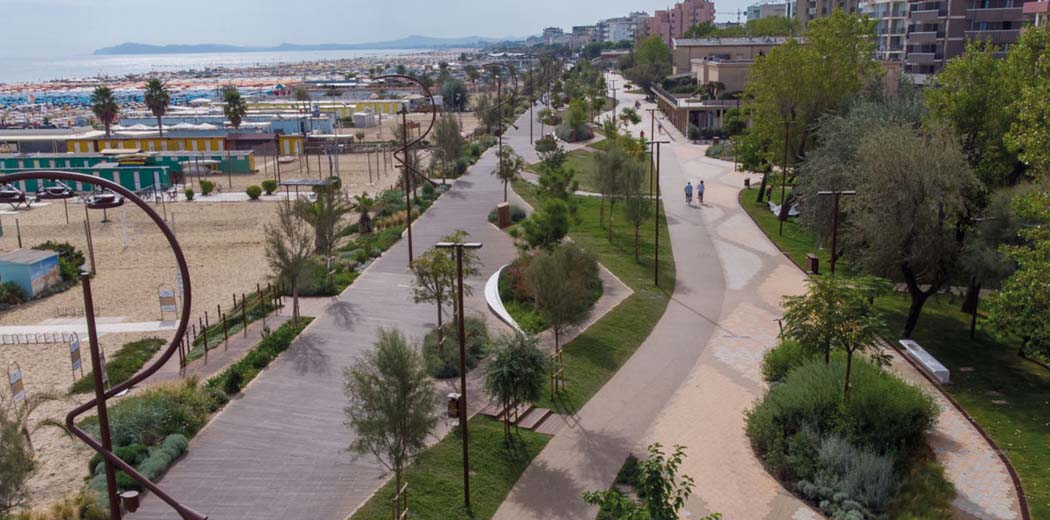
Sea Park
Rimini (Italy), 2023
The park transforms the previously unstructured, fragmented seafront into an urban park, seamlessly integrated with its surroundings. Along its 6 km length it recognizes and embraces the city’s exuberance, providing a new identity and a green urban space for tourists and locals alike. This park plays a crucial role in reducing the impact of climate change while mitigating the intense touristic impact on the urban character and quality of the area.
Developer: Municipality of Rimini
Authors: Benedetta Tagliabue - EMBT Architects
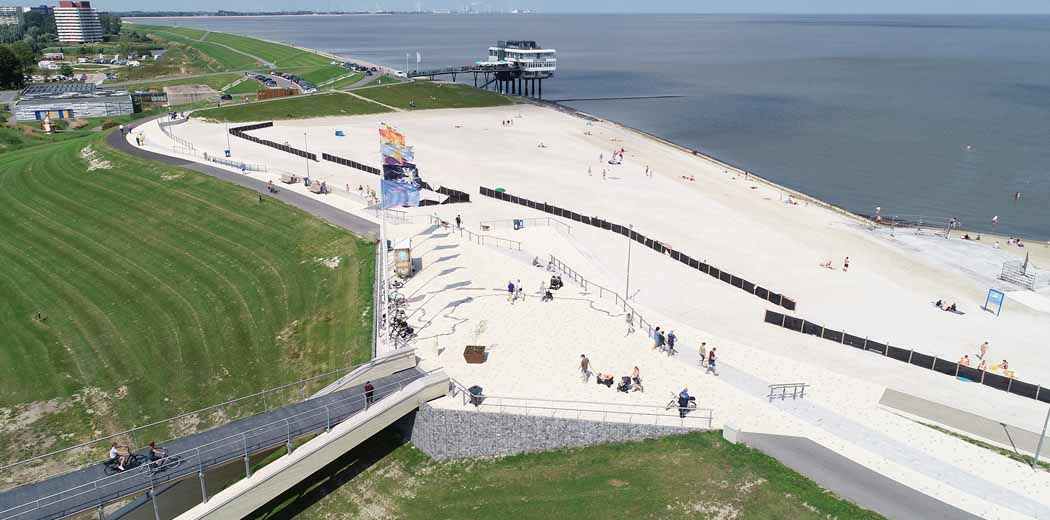
Beach boulevard.
Delfzijl (Netherlands), 2021
The project has reconnected the city centre of Delfzijl to the Wadden Sea. Due to rising sea levels and climate change, there was a need to increase defences, which had created a visual barrier between the city and the sea. The new boulevard addresses this issue by linking the two and generating a new public space by means of infrastructural improvements and ecological restoration. The engineering work inspired the design, and the resulting intervention promotes and improves access to the sea, and facilitates a better understanding of the landscape.
Developer: Gemeente Eemsdelta
Authors: LAOS Landschaps Architectur
Among the works submitted, the jury has selected 20 projects that will become part of the Archive of the European Prize for Urban Public Space.
The winner will be made public at a prize-giving ceremony that is to be held at the CCCB the 29 October.


